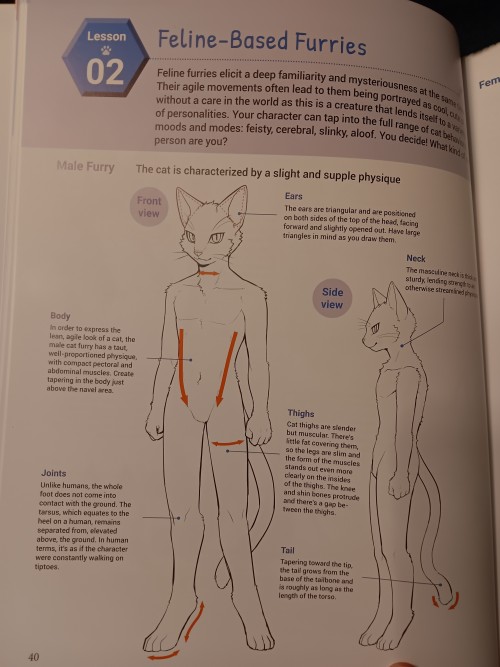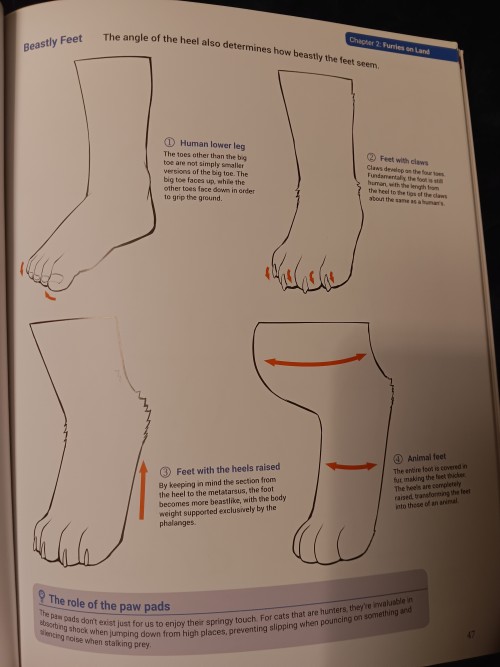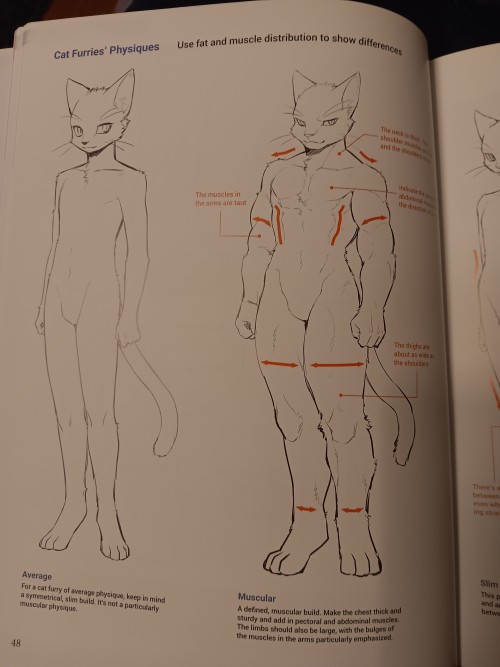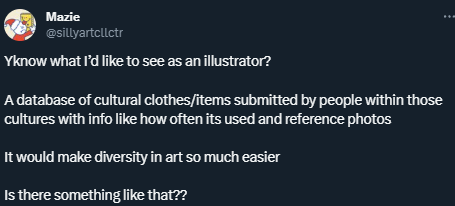Dont Know If You Were Joking About Needing Catboy References A Couple Of Weeks Back But Here Ya Go
Dont know if you were joking about needing catboy references a couple of weeks back but here ya go










Theres one for sheep too if you need that

the sacred texts.... thank you for bestowing it upon me
More Posts from Defis-archive and Others

tweet
Something like this would be so colossally helpful. I'm sick and tired of trying to research specific clothing from any given culture and being met with either racist stereotypical costumes worn by yt people or ai generated garbage nonsense, and trying to be hyper specific with searches yields fuck all. Like I generally just cannot trust the legitimacy of most search results at this point. It's extremely frustrating. If there are good resources for this then they're buried deep under all the other bullshit, and idk where to start looking.
it's funny although a little exasperating how artists designing "princess" or medieval-esque gowns really do not understand how those types of clothes are constructed. We're all so used to modern day garments that are like... all sewn together in one layer of cloth, nobody seems to realize all of the bits and pieces were actually attached in layers.
So like look at this mid-1400's fit:


to get the effect of that orange gown, you've got
chemise next to the skin like a slip (not visible here) (sometimes you let a bit of this show at the neckline) (the point is not to sweat into your nice clothes and ruin them)
kirtle, or undergown. (your basic dress, acceptable to be seen by other people) this is the puffing bits visible at the elbow, cleavage, and slashed sleeve. It's a whole ass dress in there. Square neckline usually. In the left picture it's probably the mustard yellow layer on the standing figure.
coat, or gown. This is the orange diamond pattern part. It's also the bit of darker color visible in the V of the neckline.
surcoat, or sleeveless overgown. THIS is the yellow tapestry print. In the left picture it's the long printed blue dress on the standing figure
if you want to get really fancy you can add basically a kerchief or netting over the bare neck/shoulders. It can be tucked into the neckline or it can sit on top. That's called a partlet.
the best I can tell you is that they were technically in a mini-ice-age during this era. Still looks hot as balls though.
Coats and surcoats are really more for rich people though, normal folks will be wearing this look:

tbh I have a trapeze dress from target that looks exactly like that pale blue one. ye olden t-shirt dress.
so now look here:

(this is a princess btw) both pieces are made of the same blue material so it looks as if it's all one dress, but it's not. The sleeves you're seeing are part of the gown/coat, and the ermine fur lined section on top is a sideless overgown/surcoat. You can tell she's rich as fuck because she's got MORE of that fur on the inside of the surcoat hem.
okay so now look at these guys.


Left image (that's Mary Magdelene by the way) you can see the white bottom layer peeking out at the neckline. That's a white chemise (you know, underwear). The black cloth you see behind her chest lacing is a triangular panel pinned there to Look Cool tm. We can call that bit the stomacher. Over the white underwear is the kirtle (undergown) in red patterned velvet, and over the kirtle is a gown in black. Right image is the same basic idea--you can see the base kirtle layer with a red gown laced over it. She may or may not have a stomacher behind her lacing, but I'm guessing not.
I've kind of lost the plot now and I'm just showing you images, sorry. IN CONCLUSION:

you can tell she's a queen because she's got bits I don't even know the NAMES of in this thing. Is that white bit a vest? Is she wearing a vest OVER her sideless surcoat? Girl you do not need this many layers!
Hey i’m a fashion design student so i have tons and tons of pdfs and docs with basic sewing techniques, pattern how-tos, and resources for fabric and trims. I’ve compiled it all into a shareable folder for anyone who wants to look into sewing and making their own clothing. I’ll be adding to this folder whenever i come across new resources
https://drive.google.com/drive/folders/16uhmMb8kE4P_vOSycr6XSa9zpmDijZSd?usp=sharing
anyway just a reminder for the myth lovers out there
king arthur was welsh. merlin was welsh. camelot was in wales. the lady and the lake she pops out of; welsh. excalibur; magic inanimate welsh object. etc.
on the way to see family, i drive past a lake that in which is welsh legend, is the last resting place of excalibur.
i’m just saying in my experience a lot of these legends had been so anglo-fied in the past and it’s like, all this cool shit is celtic welsh legend.
the whole point of a zine is that it's cheap to produce, amateur and homemade. if you're being asked to apply to participate in a print project, it is not a zine. if the final product is being printed and bound professionally, it is not a zine. if you are being asked to enter into any kind of licensing agreement more complex than "my work can be reproduced as part of this publication" it is not a zine. nine times put of ten if the final product costs more than $5 you have left zine country. im so serious about this.
More favourite numerical memes:
Implicit or implicit enumeration of uncountable things (example: taking inventory of the fucks which one gives)
Suggesting the divisibility of things which are not customarily thought of as able to be subdivided (example: "six whole people")
Using words that aren't numbers as numbers (example: "one William dollars")
Technically correct but contextually misleading estimates (example: looking at a group of several thousand things and observing that there are "at least three")
Incongruous qualifiers for apparently simple sums or tallies (example: she was twenty-seven years old, not counting 2014)
Hello! Tips on drafting and how much detail is too much?
Let’s see, my main tips would be to treat the first draft as if you’re telling yourself the story, the second draft like you’re organizing and enhancing the story, and the third draft as if you’re preparing for your best friend to read the story. I think this is a pretty good gauge for how much detail you add to the narrative each time you reread and edit. And it’s not about how much detail there is, it’s about how effective it is at making the story clear and immersive.
Here’s some resources that might help. There’s also an entire category in my masterlist dedicated to the drafting process.
Using Vocabulary
Describing Where Your Characters Are
Writing Intense Scenes
Writing The First Chapter
Balancing Detail & Development
When To Use “Felt”
Showing Vs Telling
How To Better Your Vocabulary & Description
Powering Through The Zero-Draft Phase
Getting Words on The Page
Sticking To A Story (Working on Multiple Projects)
Writing Your Way Through The Plot Fog
I hope this advice and these resources are helpful, and if you have any other questions feel free to leave them here :)
—
This blog is now my full-time job and first priority, so your support and engagement is critical to keeping this content regular and free of charge. Please consider Buying Me A Coffee for $3 or supporting me on Patreon for $5 a month (or more if you’d like).
$5+ Patrons receive the following immediately upon pledging: early access to all wordsnstuff content, participation in polls to choose upcoming wordsnstuff content, downloadable PDF articles, requests prioritized, direct advice chat with me, Access to patron discord server with fellow writers, and much more!
how i sleep knowing i will pirate every single thing released on disney plus

-
 fox2210 liked this · 5 days ago
fox2210 liked this · 5 days ago -
 vampmaidenslair reblogged this · 5 days ago
vampmaidenslair reblogged this · 5 days ago -
 vampmaidenslair liked this · 5 days ago
vampmaidenslair liked this · 5 days ago -
 madwisdom reblogged this · 6 days ago
madwisdom reblogged this · 6 days ago -
 randomfandomnomad liked this · 1 week ago
randomfandomnomad liked this · 1 week ago -
 savedartthings reblogged this · 1 week ago
savedartthings reblogged this · 1 week ago -
 tatsumisheep3 reblogged this · 1 week ago
tatsumisheep3 reblogged this · 1 week ago -
 therealdollyqueen liked this · 1 week ago
therealdollyqueen liked this · 1 week ago -
 mister-inconsistency liked this · 2 weeks ago
mister-inconsistency liked this · 2 weeks ago -
 carnationcottage liked this · 2 weeks ago
carnationcottage liked this · 2 weeks ago -
 drainedleafs liked this · 2 weeks ago
drainedleafs liked this · 2 weeks ago -
 dimensionwarp liked this · 2 weeks ago
dimensionwarp liked this · 2 weeks ago -
 finalfantasy7 liked this · 2 weeks ago
finalfantasy7 liked this · 2 weeks ago -
 nocturne-of-illusions reblogged this · 2 weeks ago
nocturne-of-illusions reblogged this · 2 weeks ago -
 shiocreator reblogged this · 3 weeks ago
shiocreator reblogged this · 3 weeks ago -
 axomothl liked this · 3 weeks ago
axomothl liked this · 3 weeks ago -
 bones-boneyard reblogged this · 3 weeks ago
bones-boneyard reblogged this · 3 weeks ago -
 transgenderprototype reblogged this · 3 weeks ago
transgenderprototype reblogged this · 3 weeks ago -
 transgenderprototype liked this · 3 weeks ago
transgenderprototype liked this · 3 weeks ago -
 beenoop liked this · 3 weeks ago
beenoop liked this · 3 weeks ago -
 acidicleafbat liked this · 4 weeks ago
acidicleafbat liked this · 4 weeks ago -
 gloorky liked this · 1 month ago
gloorky liked this · 1 month ago -
 brbblog123 liked this · 1 month ago
brbblog123 liked this · 1 month ago -
 lordbasilsnek liked this · 1 month ago
lordbasilsnek liked this · 1 month ago -
 ask-the-realms liked this · 1 month ago
ask-the-realms liked this · 1 month ago -
 grumpcrow reblogged this · 1 month ago
grumpcrow reblogged this · 1 month ago -
 lightning-skys liked this · 1 month ago
lightning-skys liked this · 1 month ago -
 mrhare liked this · 1 month ago
mrhare liked this · 1 month ago -
 impossiblysporadiccreation reblogged this · 1 month ago
impossiblysporadiccreation reblogged this · 1 month ago -
 impossiblysporadiccreation liked this · 1 month ago
impossiblysporadiccreation liked this · 1 month ago -
 what-are-fish reblogged this · 1 month ago
what-are-fish reblogged this · 1 month ago -
 nomadfloran liked this · 1 month ago
nomadfloran liked this · 1 month ago -
 create-moar reblogged this · 1 month ago
create-moar reblogged this · 1 month ago -
 jekylllantern reblogged this · 1 month ago
jekylllantern reblogged this · 1 month ago -
 ollysoxisfree reblogged this · 1 month ago
ollysoxisfree reblogged this · 1 month ago -
 xxazazelsxhideoutxx liked this · 1 month ago
xxazazelsxhideoutxx liked this · 1 month ago -
 ollysoxisfree reblogged this · 1 month ago
ollysoxisfree reblogged this · 1 month ago -
 ollysoxisfree liked this · 1 month ago
ollysoxisfree liked this · 1 month ago -
 mj-bites reblogged this · 1 month ago
mj-bites reblogged this · 1 month ago -
 mayb3-l8r reblogged this · 1 month ago
mayb3-l8r reblogged this · 1 month ago -
 dootisboopis liked this · 1 month ago
dootisboopis liked this · 1 month ago -
 starknightatreates liked this · 1 month ago
starknightatreates liked this · 1 month ago -
 hawkspriing reblogged this · 1 month ago
hawkspriing reblogged this · 1 month ago -
 priinnce liked this · 1 month ago
priinnce liked this · 1 month ago -
 nocturnal-notes liked this · 1 month ago
nocturnal-notes liked this · 1 month ago -
 selenecrown liked this · 1 month ago
selenecrown liked this · 1 month ago -
 heatslit reblogged this · 1 month ago
heatslit reblogged this · 1 month ago -
 heatslit liked this · 1 month ago
heatslit liked this · 1 month ago -
 cybertrieseverything liked this · 1 month ago
cybertrieseverything liked this · 1 month ago -
 vivisected-plushie reblogged this · 1 month ago
vivisected-plushie reblogged this · 1 month ago

